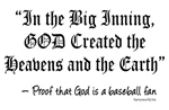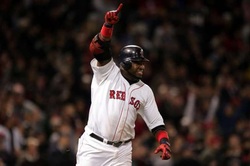Second generation ballplayers are not uncommon in the history of Major League Baseball with over two hundred such combinations. This, of course, includes the handful of three generation players which are led by the Boones, Bells and Hairstons. The first son of a former MLB player to debut in baseball history was Jack Doscher, who made his MLB debut in 1903 with the Chicago Cubs. His father, Herm, played a decade of baseball from 1872-1875 for the Brooklyn Atlantics and Washington Nationals of the National Association, then from 1879-1882 for the Troy Trojans, Chicago White Stockings and Cleveland Blues of the National League. At the time, it was probably not a big deal and little was likely made of the feat. The younger Doscher pitched in the big leagues for 5 seasons, mostly with the Brooklyn Bridegrooms, finishing his career in 1908.
For as long as anybody can trace their lineage; as long as records exist of families from generations past and as long as a history book can state that a person lived within a certain time frame and lived as part of a family, sons and daughters have taken from their parents in the workforce and in the way of life. Sons of farmers have generally been farmers, sons of businessmen become businessmen and daughters of hairdressers... and so on and so on. So the fact that many of the baseball players that have played professionally happened to have fathers that did the same thing is nothing close to a surprise.
Some of the best father son combos to both have successful big league careers include Bobby and Barry Bonds, Ken and Ken Jr Griffey, Felipe and Moises Alou, Cecil and Prince Fielder, Earl and Earl Jr Averill (Earl Jr was a guest on the Passed Ball Show) and Hal and Brian McRae (Brian was also a guest on the PBS). There have been cases where a son has outperformed the father, some in which the father simply set the bar too high and many in which either a father or son simply appeared in a game or two and because of that- they are considered a generation of a "baseball family."
In 1902, there was a catcher out of the state of Illinois by the name of George Frederick Graham. He was called Peaches for short. His nickname was given to him during a roadtrip (great names in baseball blogspot) when he reported ate an entire bucket of peaches. "Peaches" would debut that very season- as a second baseman- in the American League for the Cleveland Bronchos. The team was known as the Blues in the AL's inaugural season of 1901 and would be named after legendary second baseman Napolean Lajoie from 1903-1914 before gaining the nickname we all know them by today- the Indians.
Graham only played in two games in 1902 before moving on to the Chicago Cubs of the National League in 1903. His only appearance that season was as a pitcher. In a game against the Philadelphia Phillies, Graham was given the start in the second game of a doubleheader. Chick Fraser, a journeyman pitcher who won 175 games and lost 212 in his 14 big league seasons, opposed him for the Phils. Fraser threw the only no hitter of his big league career that day, leading Philadelphia to a 10-0 victory in the game. Fraser walked 4 and struck out five in the game. Graham, on the other hand, pitched the first 5 innings, giving up 6 runs, 3 earned, on 9 hits walking 3, striking out 4 and hitting a batter.
What stands out about this game is the fact that it was the only game Graham pitched in his entire big league career. Making it more interesting is the fact that the pitching performance was his only appearance of the season. Graham returned to the big leagues in 1908 for the Boston Doves as a backup catcher. He remained in Boston through the 1911 season (in 1911 they were called the Rustlers). He finished the 1911 season back with the Cubs before finishing off his big league career with the Phillies in 1912. He stuck around in the minor leagues through the year of 1916.
After the 1916 season, Peaches became a father for the first time. His son, Jack was born December 24th in Minneapolis, MN. At age 39, it was even less common in those days for a man to become a first time father at that age. Jack learned how to play the game, likely learning from his father, and by 1936, had signed a contract to play for the New York Yankees Middle Atlantic League team in Akron. Throughout his time in the minors, Jack showed some power but never got a shot to join the big club. As Lou Gehrig got off his iron horse and passed the baton to Babe Dahlgren, Graham remained in the minor leagues.
Sadly, Peaches passed away on July 25, 1939 at the age of 62. He never got to see his son play in the major leagues. A year later, the Yankees traded the younger Graham to the Brooklyn Dodgers but he spent several more seasons in the minor leagues. It was 1946 where Jack finally played in the big leagues for the first time, getting into 2 games and going 1-5. 11 days after making his debut, he was purchased by the New York Giants and finished the season with 14 HR and 47 RBI in 100 games. In fact, only Johnny Mize (22) hit more HR that season for the Giants. The next season, he hit 34 home runs in the minor leagues before he was traded to the San Diego Padres of the Pacific Coast League. After 48 HR and a 1.103 OPS, he found himself back in the major leagues.
The St Louis Browns and owner Bill Veeck came calling. Ironically, the 1949 St Louis Browns would have three players- OF Roy Sievers, RHP Ned Garver and OF George Elder that have appeared on my weekly baseball program Passed Ball Show. Jack Graham showed every bit the power he had in the minor leagues, hitting 24 HR and driving in 79 runs in 137 games. Unfortunately, that was the last Graham would see of the big leagues.
The next five seasons saw Graham playing 1B in the minor leagues, mostly for San Diego- both as an Independent League and as an affiliate of the Cleveland Indians- the same franchise his father broke into the big leagues with. Overall, he hit unofficially 384 home runs in the minor leagues.
It is very interesting to compare the two American Leagues the Grahams played in. Peaches came up as a 2B in the sophomore season of the circuit as a whole. Jack played for the Browns in a time where players were proud to be part of the AL. Talking before about father son combos, there were few instances where a son played in an era so different from that of his father. When Jack made his debut in 1949, the American League had built up equality to that of the National League, the dead ball era came and went, there were two World Wars involving the US, women were given the right to vote and Jackie Robinson became the first African American to play in the big leagues since Moses Fleetwood Walker in 1884. By the way, Peaches was 7 years old in 1884.


 RSS Feed
RSS Feed
